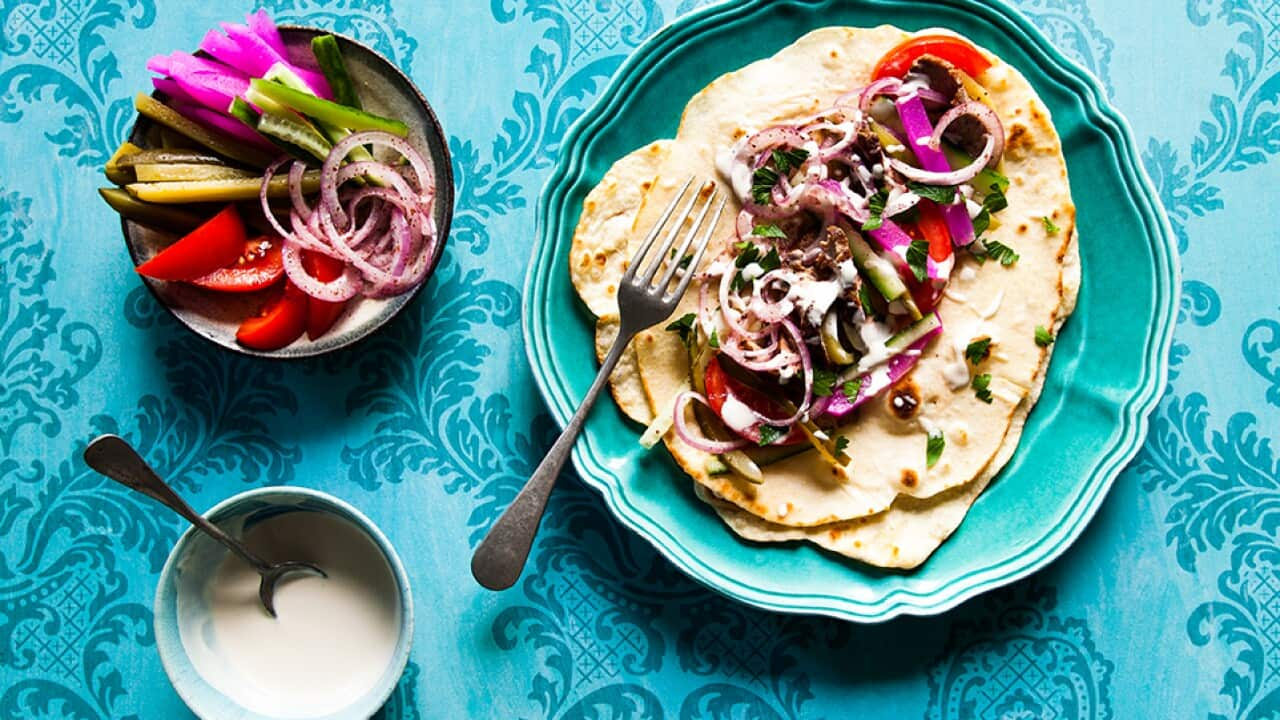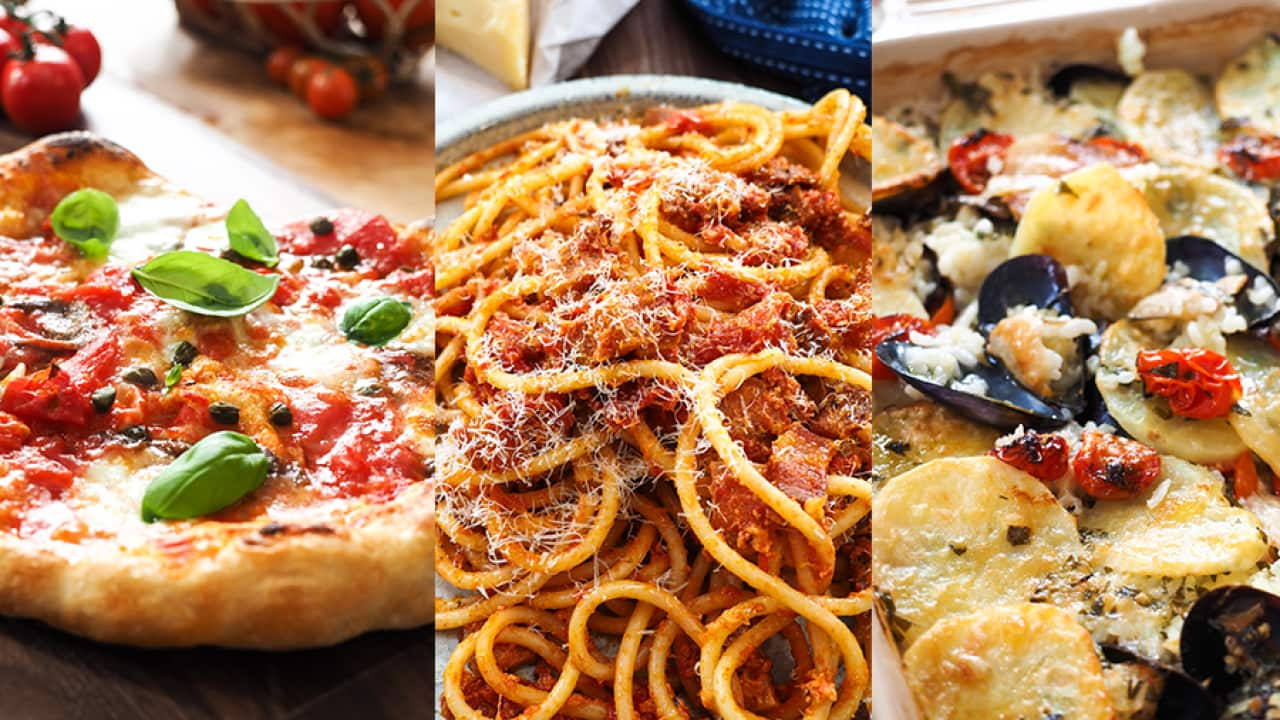--- Season 3 of airs Tuesdays at 8pm on SBS Food, or stream it free via SBS on Demand ---
Maria Mandile has a bucket that sits on her benchtop, lined with old junk mail pamphlets. This tiny vessel is her one and only kitchen bin and she estimates she empties it into the outside bin for collection "maybe once or twice a week."
Bear in mind that Maria cooks from scratch every single day, pulling fresh trays of ricotta, lasagne or pizza out of her oversized oven to feed whoever ends up at her table each night. She's also partial to making giant batches of or for 'the kids'; she's 78 and still works most days as a cook at a local daycare centre.
So, how on earth does she end up with so little kitchen waste?
"When you grow it yourself, when you cook it yourself, you want to use every single bit of it," Maria says simply. This investment from seed to plate in the food she cooks will be familiar to many older Italians. Like many Italian migrants, Maria grew up without much in a tiny town outside Benevento near Naples in Campania, Italy. As a result, she learned valuable skills to feed a family without spending much, or sometimes anything at all.
This investment from seed to plate in the food she cooks will be familiar to many older Italians. Like many Italian migrants, Maria grew up without much in a tiny town outside Benevento near Naples in Campania, Italy. As a result, she learned valuable skills to feed a family without spending much, or sometimes anything at all.

"Vegetable gardening makes you appreciate the hard work that goes into producing food," says Maria. "You quickly learn to cherish it." Source: Jonathan Kemper
"You keep the seeds from a good batch of tomatoes," Maria advises. "Wash them and let them dry, then you save them in a jar to plant them next season - free tomatoes. You can do this with so many vegetables that are easy to grow."
When you grow it yourself, when you cook it yourself, you want to use every single bit of it.
These are 'old' skills that are having something of a revival thanks to the wake-up call of the pandemic. For Maria's generation, being able to grow and make your own food was a matter of survival. If you didn't make it yourself, you simply went without.
"These days, everyone is too busy to make the pasta from flour - including me sometimes," Maria laughs. "But it's good to know that you can do it and anyone will tell you that it does taste better. So I try to make my own most of the time and even now when my children are all grown into their own families and jobs, we still buy the flour in bulk and keep it in airtight barrels." Besides flavour and saving money, making your meals from scratch has an added benefit. A 10kg bag of flour packed in a hessian or paper bag is far better for the environment than buying 20 plastic-wrapped packets of pasta. Maria can make an entire meal of pasta with tomato sauce without producing a single scrap of waste. The herbs and vegetables come out of the garden and the pasta is made from her flour stores.
Besides flavour and saving money, making your meals from scratch has an added benefit. A 10kg bag of flour packed in a hessian or paper bag is far better for the environment than buying 20 plastic-wrapped packets of pasta. Maria can make an entire meal of pasta with tomato sauce without producing a single scrap of waste. The herbs and vegetables come out of the garden and the pasta is made from her flour stores.

Maria makes taralli in bulk with her grand-daughters. Taralli stores well for weeks and is eaten plain as a snack, or added to soups and salads. Source: Bron Maxabella
Cucina povera ("poor kitchen") may , but cooking is a way of life for Maria and many older Italians.
Growing your own food means you use produce at the peak of its goodness, or preserve it for a meal cooked out of season. It's why passata is such a staple of Italian cooking - a way of using every last tomato to bring summer's sun-ripened nutrition to the winter table.
"These days, everyone is too busy to make the pasta from flour - including me sometimes."
A loaf of bread is made on the weekend to slice fresh and dip in olive oil, then later in the week it's toasted for or to mix with tomato, garlic and oregano to make . There's also or bread dumplings to make using stale bread. While don't sound amazing, once you mix them with pecorino and herbs and soften them in a tomato sauce, you're onto a winner.
With a bit of luck, you'll remember to keep enough stale bread aside to make , a dish that turns old bread into a decadent chocolate pudding. Potatoes are enjoyed baked, as chips or boiled and mashed to make or pita di patate, a dish layered with mashed potato, onion and cheese. Leftover wine is sloshed into ragu, taralli and stews. Even leftover pasta is turned into or and leftover greens are . It's the cycle of cucina povera.
Potatoes are enjoyed baked, as chips or boiled and mashed to make or pita di patate, a dish layered with mashed potato, onion and cheese. Leftover wine is sloshed into ragu, taralli and stews. Even leftover pasta is turned into or and leftover greens are . It's the cycle of cucina povera.

Left-over bread cake with chocolate and cherries (torta di pane e cioccolato) Source: Cook like an Italian
It's starting to seem obvious why Maria's kitchen bin is so small, but it's really just the beginning. The cucina povera mentality stretches into every aspect of living.
Tins are painted to become plant pots, vases and storage containers. Old jars keep the seeds for next year's crops dry, or house dried herbs that were grown in old Styrofoam boxes collected from the produce market. Passata is preserved in the same sterilised bottles and jars, year after year. There's not a scrap of plastic that enters Maria's home that doesn't find a life of service before it's finally retired. She buys most of her meat direct from the butcher, but should a supermarket meat tray cross her counter, it's quickly washed and commandeered as a seedling tray.
There's not a scrap of plastic that enters Maria's home that doesn't find a life of service before it's finally retired. She buys most of her meat direct from the butcher, but should a supermarket meat tray cross her counter, it's quickly washed and commandeered as a seedling tray.

In an Italian home, old jars have many lives; this time to preserve seeds to use for many years. Source: Bron Maxabella
It's not unusual to see plastic bags hanging merrily on Maria's washing line in amongst the clothes.
Plastic bags are washed and reused countless times; it's not unusual to see plastic bags hanging merrily on Maria's washing line in amongst the clothes. She'll buy vegetables in bulk and portion them out to freeze in those bags many times before they finally end their life ballooned around plants as mini-hothouses in the veggie patch.
"Why spend your money on things that you already have at home?" Maria asks. "It just needs a bit of thinking to discover the things that everything you buy can do for you."








